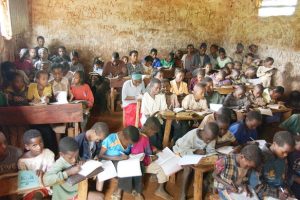
The recent visit by Ethiopian foreign minister Gedu Andargachew to Khartoum came at a time when neighboring Sudan was caught in a political impasse as the civilian opposition and the military officers who led the coup against Al Basher had not reached a consensus as to the nature of the political transition. A week or so after the foreign minister’s visit things seemed to evolve in a positive direction. This week regime and opposition have agreed on a three-year transition period that will be led by both military and civilian opposition that will oversee the modalities of the transition to democracy.
This is no doubt a hugely important development that augurs well for Sudan’s political future as well as for the Horn region as a whole. A political analyst on a recent Al Jazeera TV program called the ongoing revolutions in Algeria, Sudan and Libya as the continuation of the first Arab Spring of 2011 that started in Tunisia following Bouazizi, the street vendor’s self-immolation in protest against the humiliating bullying in the hands of the Tunisian police.
It is often said that a single spark can start a prairie fire. Most recently, the fire has spread down from the north towards the south and now seems to engulf countries nearer to the Horn of Africa. The political crisis in Sudan erupted quite dramatically and so far avoided the path of chaos and violence that is often characteristic of such events in Africa. The military as well as the civilian opposition seem to have learned an important lesson from developments in neighboring Egypt and Libya in particular that have assumed the worst features of what is known as the Arab Spring.
The movement for democratic change has engulfed engulf one African country after the other located inside or outside the Arab north Africa so much so that we can now talk about an African Spring that includes democratic developments in Zimbabwe and Ethiopia as well. In this African Spring, the causes and objectives of change, rather than geographical locations, are the main determinants of these democratic movements that are led not by traditional or established political parties but by ordinary people in the streets. Their objectives are freedom from dictatorship, for economic equity and against corrupt elites, military or civilians.
The other common factor these movements share is not only spontaneity. The changes are also full of paradoxes. In almost all cases it is the people who fight and die for freedom while the elites, military or civilian, highjack the process. The ongoing struggle in Sudan is therefore reduced to the usual dilemma that can be expressed as ‘winners take all or losers lose all’. If the African Spring is to succeed in replacing tyranny with democracy, the process will have to be peaceful, orderly and all-inclusive.
The same applies to Sudan and recent trends seem to take this option. Neither the army alone nor the civilian opposition alone could lead the democratic process. Together, they may safely sail to the other side of the river. Exclusivity would only breed rancor and sooner or later lead to chaos and anarchy and the derailment of the African Spring. Sudan seems to have avoided this path, at least for now. Ethiopia is still in the throes of a political change that has not fully consummated itself.
It is a revolution that was started by the people of Ethiopia and then channeled towards a reformist agenda by the reformist wing of the ruling party. This faction saved the party by channeling people’s spontaneous anger and revolutionary aspirations towards a more liberal and pacifist direction. This is what makes the Ethiopian reformist movement different from the Arab Spring countries of north Africa like Egypt and Libya that ended in violence.
There, the revolutions were reversed by forces that emerged from within the military and high jacked the student and mass uprisings drenching them into pools of blood and liquidating the slightest aspiration for freedom and human rights Like in Sudan, the popular unrest in Ethiopia was also spontaneous and sometimes bloody until the emergence of the reformist movement that could not stage Egyptian-style coup or descend into a Libyan style anarchy. The military in Ethiopia has so far supported the changes that are taking place in the country, serving as peace keepers in areas where ethnic conflicts have characterized the post-reform process that is still displacing millions across the country.
The fact that the military in Sudan has finally taken a positive and constructive role in the ongoing process no doubt sends signals of optimism across the region. If Sudan goes the civilian and democratic way after three years as agreed in the latest communiqué, then that would represent a triumph of common sense. On the other hand a peaceful and orderly handling of the crisis in Sudan will have a positive impact on the Horn region and on Eritrea in particular that has so far kept itself insulated from the unfolding African Spring.
No country in this region or in the world remain immune to change and no regime will stay in place forever. The time is fast approaching for countries to make a peaceful and orderly transition to freedom and democracy or lose whatever they might have gained in the past by living in an ivory tower aloof of what is going on around them or in the larger world. Given the absence of a democratic culture in countries of the Horn, and the weakness of the civilian opposition forces, the road ahead might be rocky.
One would however wish that Sudan, Eritrea and Ethiopia, being key countries in the Horn, would handle the popular demand for freedom and democracy peacefully because doing otherwise might spell disaster by releasing a chain of events that might plunge the region into an Apocalyptic breakdown. South Sudan and Somalia should serve as warning signals against such an Apocalyptic vision and as lessons on how not to handle a democratic transition whereby political elites vie for power and only bring misery to the people who aspire for peace and democracy. All countries of the Horn are more or less still in the midst of an unpredictable future.
Ethiopia is facing ethnic violence and massive displacements and Somalia is wrestling with the demons of Al Shabab and its international affiliates that are working to turn the region into an ideal place for ISIS to try and realize its dream of resurrecting the Islamic caliphate that has died miserably in Iraq and Syria. That, however, would be the last thing all sane people in the Horn wish to see in the region. The better bet for the region would be the peaceful settlement of the political crisis in Sudan, and the end of one man one party rule in Eritrea which will sooner or later evolve in a similar direction. A lasting peace in South Sudan and Ethiopia going truly democratic would impact the Horn region in a positive way.
However, the dust raised by the Arab Spring and blowing across the Horn region might not only be far from settling but can as well become as unpredictable as its inception. By agreeing to a three-year transition time table and power sharing with the civilian opposition, Sudan seems to have avoided the worst, at least for now. It would however be comforting to realize that time will be the final judge as to where the fast momentum of the changes that are taking place in this part of Africa would go in the next few months and years from now.
This is a region where events move according to unwritten scripts and where the actors and directors of the political saga emerge from complete obscurity and jostle to place themselves in the lead roles. Let us hope for now that African countries will finally succeed in avoiding the stereotype of failed states, now that the people are awakening to the fact that there is nothing to be gained from violence and anarchy and everything to be gained from a peaceful transition to freedom and democracy.
The Ethiopian Herald Sunday Edition, May19/ 2019
BY MULUGETA GUDETA





